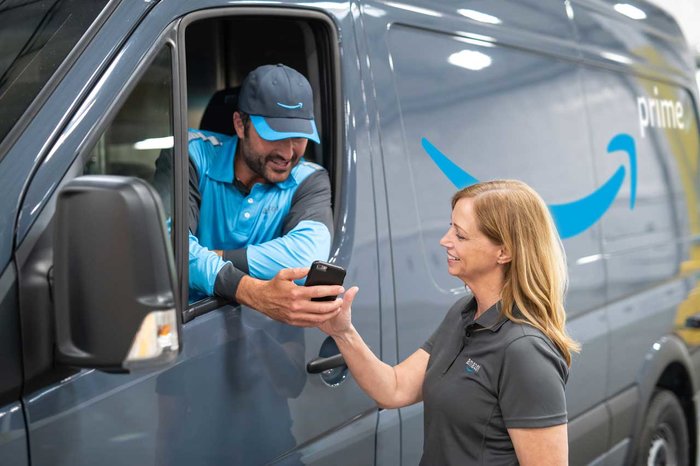Amazon has announced it wants to engage small delivery companies to deliver the last mile. Is Amazon seeking to compete with delivery giants UPS, FedEx and USPS, or does it have bigger motivations? Marek Różycki (Last Mile Experts) and Ian Kerr (Postal Hub Podcast) analyze this development.
Amazon has announced it wants to build up its delivery capabilities by contracting out last-mile delivery to small companies – the very same thing many postal and parcel operators have been doing for decades – and is growing its own potential to operate independently.
Amazon says it needs more capacity in the USA to handle its growing delivery needs. Does this mean Amazon has little faith in its existing partners – UPS, FedEx and USPS – to meet future growth? Or is Amazon seeking to improve its bargaining position with the delivery giants? Is it all about improving the customer experience?
The concept
Amazon is pitching this delivery company model as being appropriate for anyone, even people with no delivery experience. Subcontractors will be able to use Amazon’s technology and processes to set up and run their delivery businesses.
Amazon says it will take an ‘active role’ in helping people set up their businesses. According to Amazon, successful owners can earn as much as US$300,000 in annual profit operating a fleet of up to 40 delivery vehicles. Will those promises come back to haunt Amazon?
No doubt Amazon has been learning from its experiences with Amazon Flex and Amazon Logistics. The new delivery fleet will be a test for Amazon’s training, including its interactive apps and videos. If the training is backed up with consistent parcel volumes and solid remuneration, then Amazon should have happy delivery contractors although practice to date has been varied.
The black vehicles will have Amazon branding. This brings an extra element of cost for the subcontractor compared to sourcing the classic white vans, a lesson Amazon doesn’t seem to have learned.
Following trials, Amazon has calculated that the optimum-sized business has 20 to 40 vans, with an owner/operator model. There could be another motivation for encouraging businesses to have multiple vehicles/drivers – the reduced possibility of drivers claiming employee status.
Will this hurt the big carriers’ feelings?
Amazon says there’s ‘more than enough for everybody.’ Amazon’s renewed push into the last mile might not affect major carriers’ expansion and investment plans in the short term, but if Amazon logistics grows to become an independent player with nationwide capacity, the story may be different.
Will Amazon deliver non-Amazon parcels?
Most likely Amazon will open up its delivery network to non-Amazon parcels, should it have capacity. Its own deliveries will take precedence.
Is it really all that new?
Delivery service partners are not a new thing and have been used with success since Marek was responsible for Amazon Last Mile in Europe several years ago. What is new and interesting is the feeling that Amazon may really move into the commercial carriers’ (and USPS’s) turf due to the need to optimize line hauls and routes in some areas and therefore siphon parcels from the ‘non-Amazonian’ market.
The key questions most people would ask are: Is this really on the cards? Is this a real threat to the other carriers? And What does it mean for the consumer?
Answering them in turn, contrary to our more conservative responses to date, the answer to the first two questions is yes. As regards the last one, this has to be good news due to Amazon’s obsession with customer experience, but only up to the point at which competition is stifled. Should Amazon become so dominant that there is no direct competitor? Who knows what Mr Bezos will do.
Bios:

Marek Różycki is managing partner at Last Mile Experts, specializing in CEP and e-commerce last-mile advisory.
 Ian Kerr is the founder and host of the Postal Hub Podcast, the weekly podcast for the postal and delivery sectors.
Ian Kerr is the founder and host of the Postal Hub Podcast, the weekly podcast for the postal and delivery sectors.


